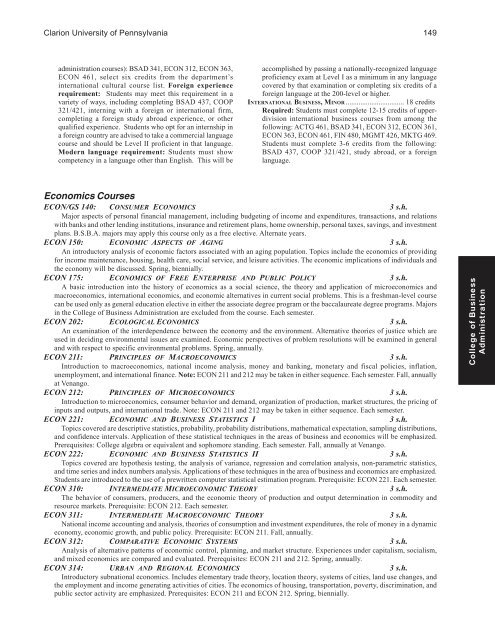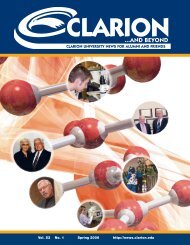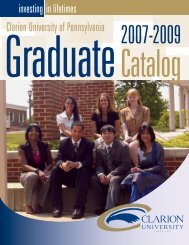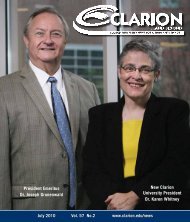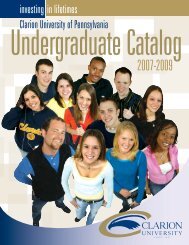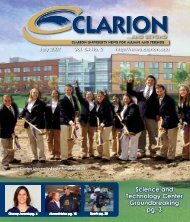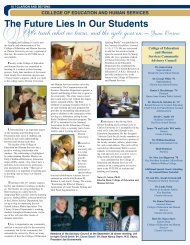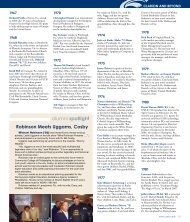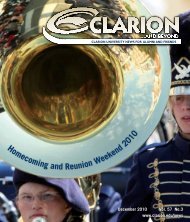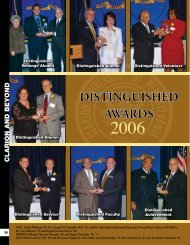Undergraduate - Clarion University
Undergraduate - Clarion University
Undergraduate - Clarion University
You also want an ePaper? Increase the reach of your titles
YUMPU automatically turns print PDFs into web optimized ePapers that Google loves.
<strong>Clarion</strong> <strong>University</strong> of Pennsylvania 149<br />
administration courses): BSAD 341, ECON 312, ECON 363,<br />
ECON 461, select six credits from the department’s<br />
international cultural course list. Foreign experience<br />
requirement: Students may meet this requirement in a<br />
variety of ways, including completing BSAD 437, COOP<br />
321/421, interning with a foreign or international firm,<br />
completing a foreign study abroad experience, or other<br />
qualified experience. Students who opt for an internship in<br />
a foreign country are advised to take a commercial language<br />
course and should be Level II proficient in that language.<br />
Modern language requirement: Students must show<br />
competency in a language other than English. This will be<br />
accomplished by passing a nationally-recognized language<br />
proficiency exam at Level I as a minimum in any language<br />
covered by that examination or completing six credits of a<br />
foreign language at the 200-level or higher.<br />
INTERNATIONAL BUSINESS, MINOR ................................ 18 credits<br />
Required: Students must complete 12-15 credits of upperdivision<br />
international business courses from among the<br />
following: ACTG 461, BSAD 341, ECON 312, ECON 361,<br />
ECON 363, ECON 461, FIN 480, MGMT 426, MKTG 469.<br />
Students must complete 3-6 credits from the following:<br />
BSAD 437, COOP 321/421, study abroad, or a foreign<br />
language.<br />
Economics Courses<br />
ECON/GS 140: CONSUMER ECONOMICS 3 s.h.<br />
Major aspects of personal financial management, including budgeting of income and expenditures, transactions, and relations<br />
with banks and other lending institutions, insurance and retirement plans, home ownership, personal taxes, savings, and investment<br />
plans. B.S.B.A. majors may apply this course only as a free elective. Alternate years.<br />
ECON 150: ECONOMIC ASPECTS OF AGING 3 s.h.<br />
An introductory analysis of economic factors associated with an aging population. Topics include the economics of providing<br />
for income maintenance, housing, health care, social service, and leisure activities. The economic implications of individuals and<br />
the economy will be discussed. Spring, biennially.<br />
ECON 175: ECONOMICS OF FREE ENTERPRISE AND PUBLIC POLICY 3 s.h.<br />
A basic introduction into the history of economics as a social science, the theory and application of microeconomics and<br />
macroeconomics, international economics, and economic alternatives in current social problems. This is a freshman-level course<br />
can be used only as general education elective in either the associate degree program or the baccalaureate degree programs. Majors<br />
in the College of Business Administration are excluded from the course. Each semester.<br />
ECON 202: ECOLOGICAL ECONOMICS 3 s.h.<br />
An examination of the interdependence between the economy and the environment. Alternative theories of justice which are<br />
used in deciding environmental issues are examined. Economic perspectives of problem resolutions will be examined in general<br />
and with respect to specific environmental problems. Spring, annually.<br />
ECON 211: PRINCIPLES OF MACROECONOMICS 3 s.h.<br />
Introduction to macroeconomics, national income analysis, money and banking, monetary and fiscal policies, inflation,<br />
unemployment, and international finance. Note: ECON 211 and 212 may be taken in either sequence. Each semester. Fall, annually<br />
at Venango.<br />
ECON 212: PRINCIPLES OF MICROECONOMICS 3 s.h.<br />
Introduction to microeconomics, consumer behavior and demand, organization of production, market structures, the pricing of<br />
inputs and outputs, and international trade. Note: ECON 211 and 212 may be taken in either sequence. Each semester.<br />
ECON 221: ECONOMIC AND BUSINESS STATISTICS I 3 s.h.<br />
Topics covered are descriptive statistics, probability, probability distributions, mathematical expectation, sampling distributions,<br />
and confidence intervals. Application of these statistical techniques in the areas of business and economics will be emphasized.<br />
Prerequisites: College algebra or equivalent and sophomore standing. Each semester. Fall, annually at Venango.<br />
ECON 222: ECONOMIC AND BUSINESS STATISTICS II 3 s.h.<br />
Topics covered are hypothesis testing, the analysis of variance, regression and correlation analysis, non-parametric statistics,<br />
and time series and index numbers analysis. Applications of these techniques in the area of business and economics are emphasized.<br />
Students are introduced to the use of a prewritten computer statistical estimation program. Prerequisite: ECON 221. Each semester.<br />
ECON 310: INTERMEDIATE MICROECONOMIC THEORY 3 s.h.<br />
The behavior of consumers, producers, and the economic theory of production and output determination in commodity and<br />
resource markets. Prerequisite: ECON 212. Each semester.<br />
ECON 311: INTERMEDIATE MACROECONOMIC THEORY 3 s.h.<br />
National income accounting and analysis, theories of consumption and investment expenditures, the role of money in a dynamic<br />
economy, economic growth, and public policy. Prerequisite: ECON 211. Fall, annually.<br />
ECON 312: COMPARATIVE ECONOMIC SYSTEMS 3 s.h.<br />
Analysis of alternative patterns of economic control, planning, and market structure. Experiences under capitalism, socialism,<br />
and mixed economics are compared and evaluated. Prerequisites: ECON 211 and 212. Spring, annually.<br />
ECON 314: URBAN AND REGIONAL ECONOMICS 3 s.h.<br />
Introductory subnational economics. Includes elementary trade theory, location theory, systems of cities, land use changes, and<br />
the employment and income generating activities of cities. The economics of housing, transportation, poverty, discrimination, and<br />
public sector activity are emphasized. Prerequisites: ECON 211 and ECON 212. Spring, biennially.<br />
College of Business<br />
Administration


